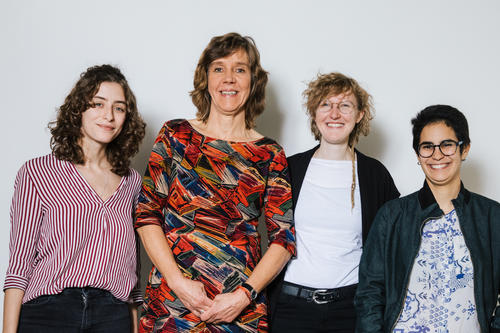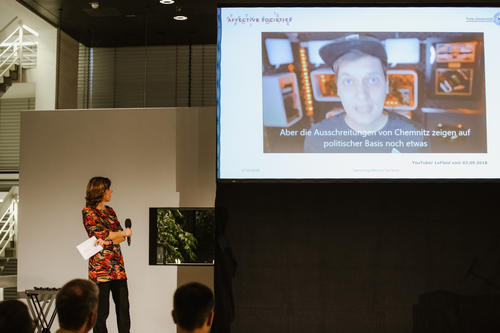Research project "Journalism and the Order of Emotions" launched
The members of the research project: Ana Makhashvili, Prof. Dr. Margreth Lünenborg, Luise Erbentraut, Débora Medeiros (l.t.r.)
Image Credit: Miriam Klingl
Prof. Dr. Margreth Lünenborg at the Science Slam 2019
Image Credit: Miriam Klingl
The research projects of the Collaborative Research Centre 1171 "Affective Societies" entered their second term with a science slam on 17 October 2019 in the Dahlem Museums. The Institute for Media and Communication Studies is represented by the project "Journalism and its Order of Emotions" under the direction of Prof. Margreth Lünenborg. As a Postdoc in the project, Débora Medeiros will conduct a longitudinal analysis of migration reporting in Germany since the 1990s. Ana Makhashvili joins the project as a doctoral student and will in particular investigate the affect dynamics of the interaction between (para-)journalism and its audience on social media channels.
In the first phase of the project, Reality TV was examined as a media format that explicitly focuses on the creation and production of affects. Now, the theoretical concepts and methodological approaches developed there are being applied to journalism.
The focus here is on the question of how journalism, which is normatively committed to the ideal of neutral reporting, nevertheless generates emotions and makes them visible in discourse. This is examined in audiovisual reporting on the subject of flight and migration since 1990. In addition to professional journalism, parajournalistic formats such as YouTube videos also come into focus. We ask which affective dynamics become visible in the media formats themselves and in the interaction with the users.
Part of the project is a cooperation with Neue Deutsche Medienmacher*innen and the Bundeszentrale für politische Bildung in order to make selected research results accessible to a non-scientific audience in multimedia formats.

